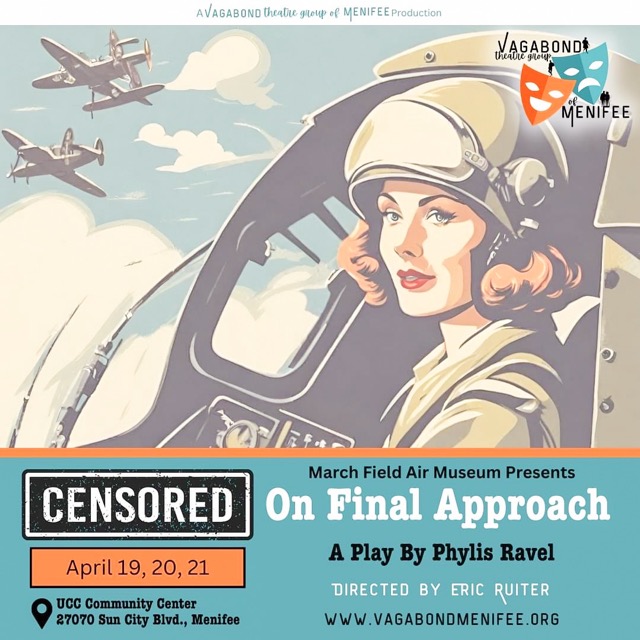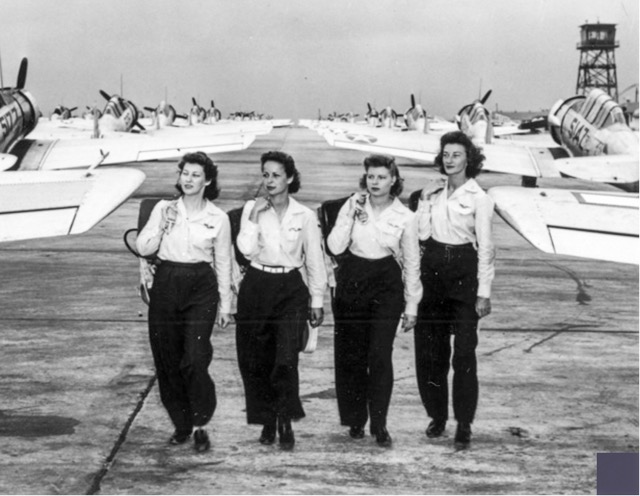Censored on Final Approach
MENIFEE – It was a sign of the times, even during the extreme need for manpower during World War II. The idea that womanpower in the form of pilots, could also contribute to the Army Air Force wasn’t a concept raging with popularity.
One thing for women to fill the manufacturing jobs vacated by the men who went off to the service, the women collectively known as “Rosie the Riveter.” But taking to the air, as military pilots?
Barely two decades after women gained the right to vote, this was just too much for many, especially the men making the decisions. Even though no one was suggesting combat missions overseas. The idea was to provide support pilots to essential roles in the States.
Jacqueline Cochran, a famed pilot in the day wasn’t waiting around for permission and left for England with a group of women to perform non-combat piloting services for the British Air Transport Auxiliary.
When she returned stateside to recruit a second group of female pilots, she learned that the Army Air Force had reconsidered to a degree, forming the Women’s Auxiliary Ferrying Squadron, (WAFS) in September 1942. Initially, it was a group of just 25 female pilots ferrying military planes from the factory to domestic air bases.
Enlisting the aid of Gen. “Hap” Arnold of the Army Air Force, Cochran, and Arnold convinced the powers they could provide more women pilots flying more tasks and in August 1943 the WAFS and another group were merged to form the WASPs, Women Airforce Service Pilots.
According to the U.S. Army, “in the 16 months the WASPs existed, more than 25,000 women applied for training; only 1,879 candidates were accepted. Among them, 1,074 completed the grueling program – a better “wash-out” rate than 50 percent of male pilot cadets.”
In addition to “ferrying, testing and delivering planes for repair, they also performed check flights, put flying time on new engines, towed targets for anti-aircraft gunnery practice, flew searchlight tracking missions, and instructed male pilot cadets.”
And for the most part, it happened on the down low.
This weekend, the newly created Vagabond Theater Group of Menifee debuts its initial production, “Censored on Final Approach,” written by the late playwright Phylis Ravel. Based on true incidents, the play focuses on 4 WASP pilots and their struggles with sexual harassment, discrimination, and even sabotage.
“We want to enrich local communities with performing arts productions, top-tier classes, and unique outreach programs,” Vagabond’s Executive Director Sarah Gibbon relates. “We are also dedicated to Senior Outreach, to take the arts to senior communities – senior homes, centers, and facilities.”
Board Member and the historical consultant for the show, Larry Sichter notes the subject holds particular interest to the IE, as some WASPs were stationed at March Field, while Gen. Arnold commanded the base in the 1930’s.
The WASPs were short-lived and often forgotten, disbanded in December 1944, sent home with a grateful, but patronizing salute from Gen. Arnold.
“When we needed you, you came through and have served most commendably under very difficult circumstances, but now the war situation has changed and the time has come when your volunteer services are no longer needed. The situation is that if you continue in service, you will be replacing instead of releasing our young men. I know the WASP wouldn’t want that. I want you to know that I appreciate your war service and the AAF will miss you…”
It wasn’t until 1977 that President Jimmy Carter signed into law a bill that recognized the active military service of the Wasp.
Censored on Final Approach runs this weekend, April 19, 20 & 21, at the UCC Community Center (27070 Sun City Blvd, Menifee). Ticket information is available at www.vagabondmenifee.org.
For More Arts News Visit www.zapinin.com/arts.



